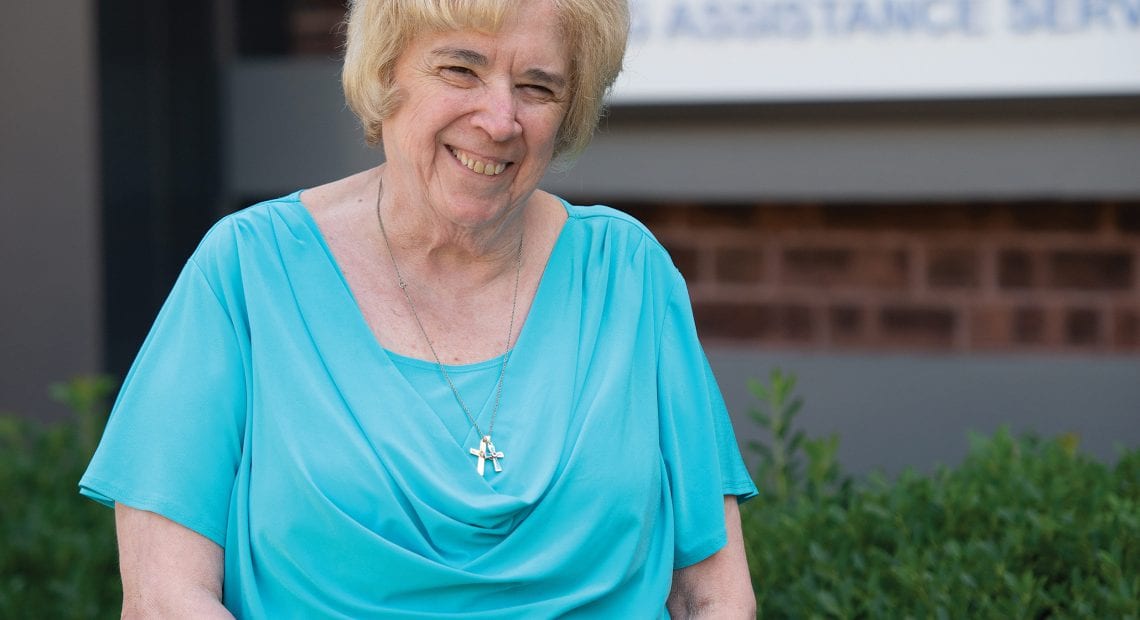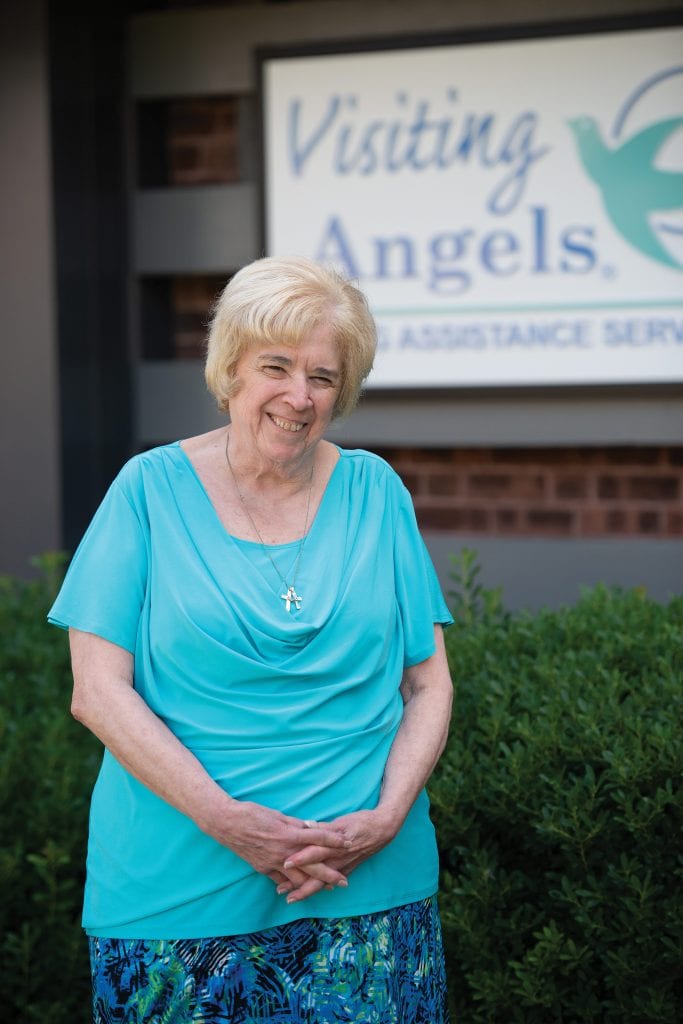Shifting the Balance
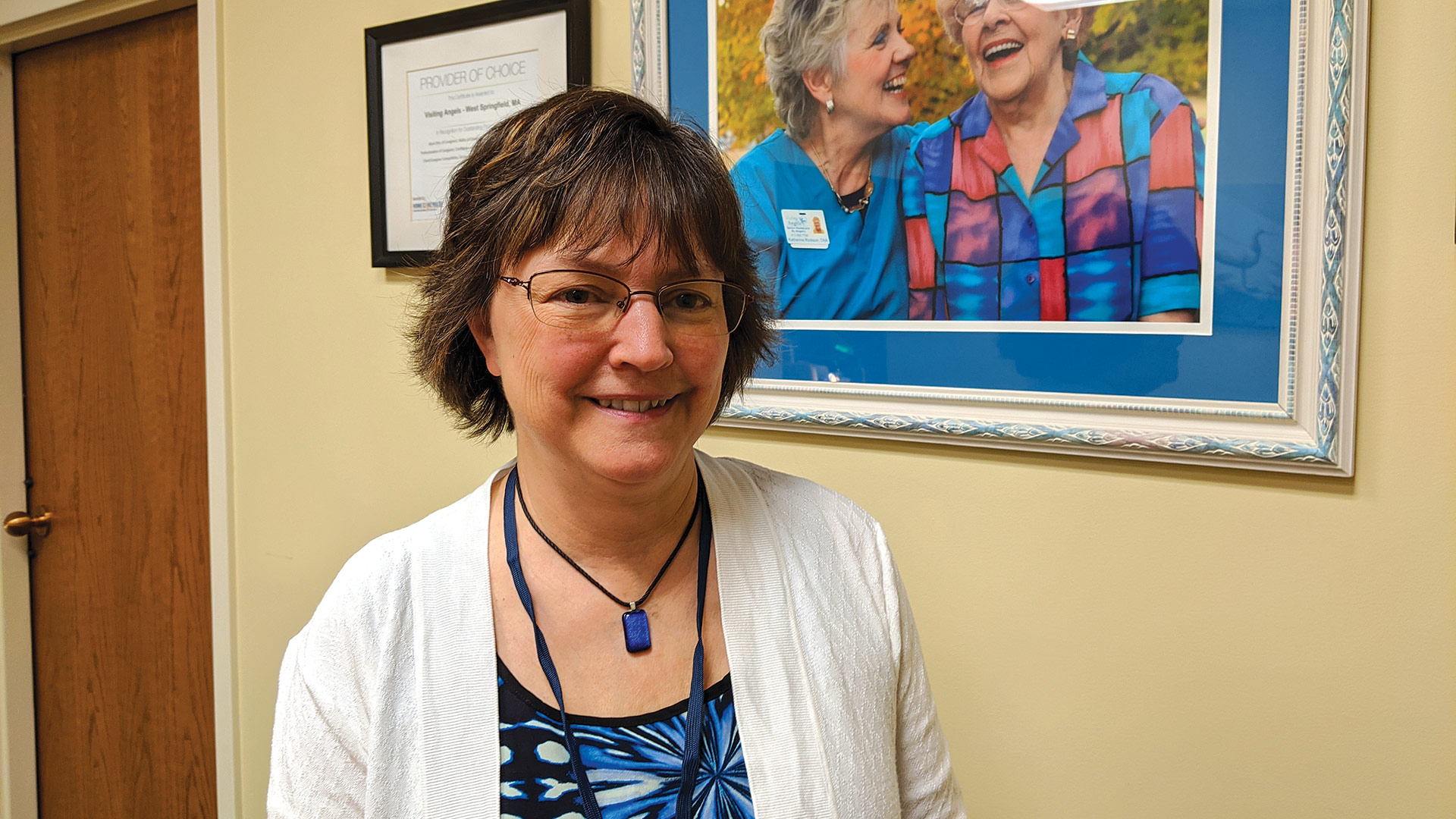
Visiting Angels Director Michele Anstett
When Michele Anstett opened a Visiting Angels franchise with her husband in 1999, it was only the ninth branch of a home-care company that now boasts more than 500 locations in the U.S. and overseas. Home care in general had yet to proliferate; maybe a dozen agencies were offering such services in the Pioneer Valley.
The law of supply and demand meant there were more caregivers than jobs, which was great for companies, she noted.
“We had more control, and they were more willing to do what we said. Because there were fewer agencies for these caregivers to go to, they had less choice. They were easier to hire back then — you could find a well-trained one easily because there was a deeper pool, and they were more experienced. The pay was lower — like $7.50 an hour when we started. And more of them were willing to work full-time. They were more likely to take whatever you could give them.”
These days, that balance has shifted, to say the least. Home-care services, both small independents and national chains, now dot the region, and workers are in demand.
“Now, it’s not us with the control,” Anstett said. “They have the control. They can pick where they want to go. They can choose how many hours they want to work. They’re less willing to take whatever you want to give them.”
It helps, she said, that her Visiting Angels franchise, now celebrating its 21st year, is a known name with deep roots in the community.
“You don’t have someone down the hall where you can yell, ‘hey, can you help me?’ This can be a challenge for some nurses, but the nurses we have appreciate meeting with a patient exclusively, being able to develop relationships they often don’t have time for in an acute-care setting.”
“When we first started, there were only a few businesses like this. It was just emerging, and it was something that was really needed,” she told BusinessWest. “Our model was based on what people wanted. We matched the caregiver to the client. We weren’t telling people, ‘we’ll come here at this time.’ We made it all about the client. But we also matched them with a caregiver, and they could meet their caregiver and say, ‘yes, this works,’ or ‘no, this isn’t a good fit.’ There’s a lot of work in matching a personality, skill level, schedule — it’s really challenging.”
That philosophy hasn’t changed over the years, but the challenge has become more intense with increased competition for certified nursing assistants, home health aides, and personal-care assistants.
Also more challenging is the level of care many patients require, in an era when hospital stays are shorter and Americans are living longer than ever before.
“I was a home-care nurse fresh out of nursing school in the early ’90s, and compared to the patients we saw then — even compared to five years ago, really — the patients are much higher acuity, much more complex, and they really need a lot of care coordination and are on so many medications,” said Priscilla Ross, executive director of Cooley Dickinson VNA & Hospice.
“One of the biggest roles of the home-care nurse is reconciling those medications, because medication errors are one of the most common reasons for rehospitalization,” she went on — for example, people often don’t follow instructions, or aren’t aware of certain drug interactions, or are mixing pharmacy prescriptions with mail-order drugs. “Things are so much more complex than years ago, with hospitals focused on shorter stays, and there’s pressure on skilled-nursing and rehab facilities for shorter stays as well, so people are coming home with more needs.”
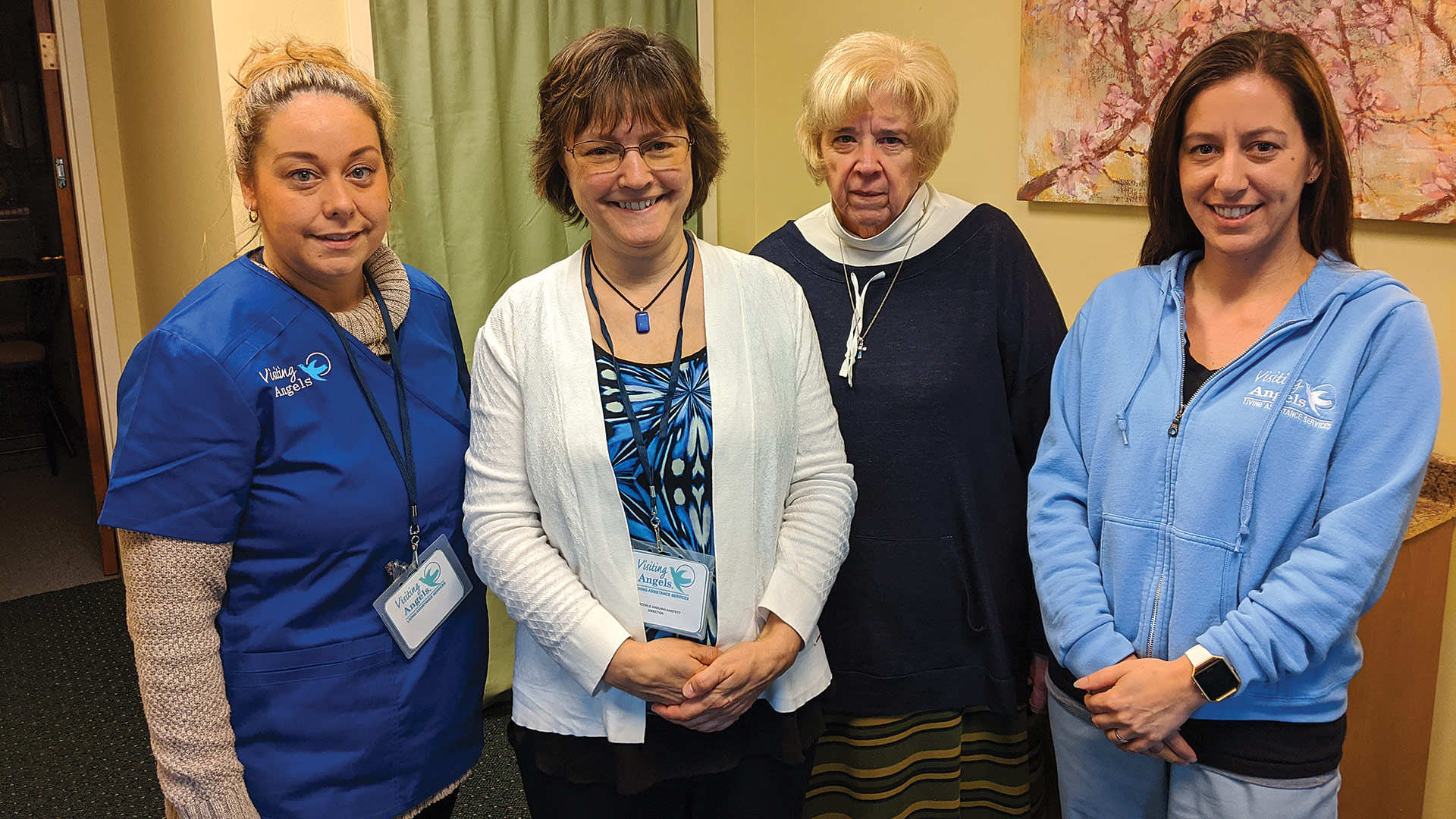
Michele Anstett (second from left) with some of her team at Visiting Angels, from left, Julie Dewberry, Helen Gobeil, and Natali Pilecki.
For this issue’s focus on the business of aging, BusinessWest spoke with several home-care professionals about what’s appealing about this critical work, what’s challenging, and why those challenges are only increasing as the senior population in the U.S. continues to swell.
Return to Form
The VNA has a sizable clinical staff, as many of its clients have been in and out of hospitals or acute rehab settings. But the focus isn’t on the illness itself, Ross said, but returning people to functional status in the short term. “They want to get back to making dinner, doing the laundry, taking care of grandchildren. With nursing and rehab, that process can happen much more quickly.”
She noted that the national shortage of non-medical home health aides may be more pronounced than the shortage of nurses, but it’s a struggle for organizations to recruit both. For nurses, not only is the pay scale less than in, say, a hospital setting, but some nurses don’t like the autonomy and independence that home care requires; they’d rather work in a team setting. Of course, other nurses desire the opposite, and relish the idea of focusing on one patient instead of several at a time.
“You don’t have someone down the hall where you can yell, ‘hey, can you help me?’ This can be a challenge for some nurses, but the nurses we have appreciate meeting with a patient exclusively, being able to develop relationships they often don’t have time for in an acute-care setting.”
Julie Dewberry, marketing and recruitment specialist for Visiting Angels, agreed. “They like the one on one,” she said. “They don’t have the pressure of one person with five different patients. Some come from nursing homes and say they don’t want to do that.”
Helen Gobeil, staffing supervisor for Visiting Angels, said determining who will be a good care worker is as much art as science.
“It’s a mother’s instinct — you’ve got to feel it,” she said about sitting with prospective staff. “You see they’re caring, they want to work, they really enjoy elders. They don’t call them old people; they respect them. I have to feel it.”
That ‘feel’ can be as simple as whether the interviewee makes eye contact, Anstett said. “What’s their demeanor? Are they a warm and caring person? If they’re warm, caring, and compassionate, that’s the basis, and we can move on to skill.”
That skill can be reflected in many ways — their degree, their experience, perhaps a referral. Sometimes, the agency will bring on someone whose only experience was taking care of their grandmother. “If they have good character, we’ll put them on a companion case, with a mentor, and help them get more education. We didn’t do that before. Now that the pool is lower, we’re trying to find ways to bring in more people.”
One way is to offer more training to staff. In addition, Visiting Angels has done well bringing on nursing students from area colleges, who are able to supplement their income while gaining on-the-job experience. “They’re very good workers,” she said.
The shallower pool of talent is only one growing challenge; a tougher financial climate is another. Wages are higher — Anstett said her goal is to keep what she pays workers above Massachusetts’ minimum wage as it creeps toward $15 over the next few years — as well as higher recruiting costs and expanded paid medical and family leave in the Bay State.
Finally, as noted earlier, workers increasingly eschew full-time work and often make home care one of two jobs, and they increasingly resist set shifts in favor of flexible schedules.
“We are a known name with deep roots, but it is a challenge,” she said. “We do well, though — we’re finding people of quality. Because of our experience, we understand what makes a good caregiver and who wouldn’t make a good caregiver, and how to screen them properly.”
Constant Mission
Roseann Martoccia, executive director of WestMass ElderCare, says her 45-year-old organization’s goal has long been in line with the goals of the home-care industry.
“From the beginning, our mission has been constant: to help people remain at home with the supports they need,” she said, noting that most people, as they age, want to remain in their homes, with some measure of independence.
To help them achieve that goal, WestMass ElderCare offers a broad range of supports, not just home care, aimed at helping seniors live independently. These range from nutrition services — it delivers about 1,400 hot meals daily in seven communities — to adult foster care; from housing support to personal-care management, helping people with chronic conditions or disabilities direct their own care by hiring and supervising personal-care attendants.
In the realm of home care, the goal is similar to other agencies: to help transition people from rehab settings into the home, and to maintain their function there.
“Our goal is to provide compassionate care and guidance so people can live in their homes and communities,” Martoccia said. “When we visit the home, we’re setting up a plan of care. What is your family doing? What do you need help with? What do you want help with? What’s most important?”
“Generally, people have chronic conditions, and their family may be at a distance, or they may not have a lot of family supports,” she continued. “In that case, we might be providing more services to them, helping them with many things they may not be able to accomplish on their own.”
WestMass focuses on the needs of family caregivers as well as patients, she added — people who have to work or raise families, but still want to make sure their parents or grandparents are OK.
“A lot of times, we hear caregiver stories about how what we do helps them and gives them peace of mind,” she said. “They may be checking in daily or weekly, but they know services will be coming.”
Cooley Dickinson VNA & Hospice has a different model than home-care agencies that focus on non-clinical assistance, often over the long term. Instead, it hires nurses and physical, occupational, and speech therapists, among other team members, to help clients transition from an acute or rehab setting to home life over a shorter term. Involving family caregivers in the process is often critical.
“We offer things your average person can’t provide without some training — wound care, IV therapy, or teaching about disease processes and how to manage an illness and manage medications,” Ross explained. “We’re teaching family members how to do wound care, how to provide care at home.”
The other side of the company is hospice care, which can be a longer-term engagement for people who are grappling with terminal illness and the decisions that come with it.
“What matters to you? What are your goals? How do you want your care to play out? It’s really hard to have that conversation, introducing that sense of taking away hope from people,” Ross said.
“But often, when you open those conversations, you’re relieving a burden for the patient and their family, and giving them an opportunity to actually talk about the elephant in the room — and that can lead to earlier access to care,” she went on. “Studies show that the earlier patients get on hospice, the better they do in the course of their terminal illness and the better the family does in the bereavement process.”
Giving Back
There’s a large, framed photograph at Visiting Angels of an aide with Anstett’s mother-in-law, who required home care due to Alzheimer’s disease around the time she and her husband opened the franchise; she passed away a few years ago. It’s a reminder that these services hit close to home for many people, and they’re important.
And not just for the clients, said Natalie Pilecki, the company’s administrative specialist. For workers in this field — at least the good ones — it’s more than a job.
“Spending time with the elderly is always nice,” she told BusinessWest. “The hours are good, the flexibility is always good, and they enjoy socializing with the elderly. Every day is different — it’s different every time you walk into their house.”
A good work experience starts with the employer, though, Anstett said. “I think we all have to value our workforce. We did a survey of our caregivers, about what’s most important to them. They put the highest value on how they’re treated. Pay was second, and benefits third. We listen to our caregivers, and those are the things we work on.”
She noted that one client has been with the company for 13 years, just one of many long-term connections being made.
“You develop a relationship with clients and their families. It’s about giving, and when you give, people respond. The job gives back.”
Joseph Bednar can be reached at [email protected]



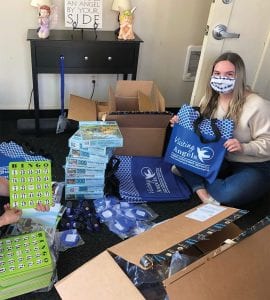 This week, Visiting Angels provided the prizes for the Bingo program. The Visiting Angels bags included a puzzle, nostalgic candy, and other assorted Visiting Angels goodies with information about the company’s services.
This week, Visiting Angels provided the prizes for the Bingo program. The Visiting Angels bags included a puzzle, nostalgic candy, and other assorted Visiting Angels goodies with information about the company’s services.